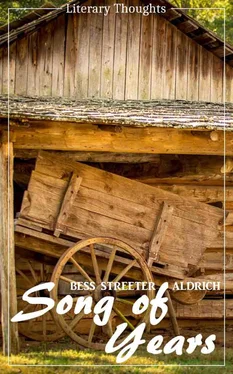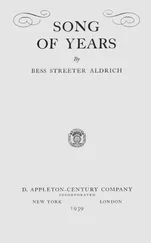Song of Years by Bess Streeter Aldrich
Literary Thoughts Edition presents
Song of Years,
by Bess Streeter Aldrich
Transscribed and Published by Jacson Keating (editor)
For more titles of the Literary Thoughts edition, visit our website: www.literarythoughts.com
All rights reserved. No part of this edition may be reproduced, stored in retrieval system, copied in any form or by any means, electronic, mechanical, photocopying, recording or otherwise transmitted without written permission from the publisher. You must not circulate this book in any format. For permission to reproduce any one part of this edition, contact us on our website: www.literarythoughts.com.
This edition is licensed for your personal enjoyment only. It may not be resold or given away to other people. If you would like to share this book with another person, please purchase an additional copy for each recipient. If you’re reading this book and did not purchase it, or it was not purchased for your use only, then please return to Amazon and purchase your own copy of the ISBN edition available below. Thank you for respecting the efforts of this edition.
The Valley of the Red Cedar is in eastern Iowa—a long strip of fertile land sprawling out beside the river whose name it bears. The Red Cedar River itself is not much more than a sturdy creek until joined by the waters of the Shell Rock and West Fork where it suddenly becomes of importance, a thing of width and depth with the right to boast of having mothered many a sawmill, grist-mill, and factory before a wheel on its banks was turned by electricity.
Just below the junction of these waters—which come together in the shape of a wild turkey’s foot—two towns lie very close to each other. Originally the tiny settlements from which they have grown were named Sturgis Falls and Prairie Rapids, and although it has been nearly a century since they were so called, the old names shall serve them here. Those who live in the Valley—or have lived there—will recognize them at once. Others will not care what they are called.
They are modern little cities, the one leaning to industry, the other proud of its fine college. Like sisters they lie there together by the Red Cedar which saw their beginnings nearly a hundred years ago. And like sisters they quarrel and argue on occasion, but stand up for each other indignantly if any outsider ventures criticism.
Between the two towns on the north and east side of the curving river is a strip of fertile farming land which was preëmpted by some of the first settlers in the Valley.
If you follow a paved highway a few miles to the north and west of it, turning at a certain point onto a side road, you will come to a wide iron gate set in a fence surrounding farm fields. Open the gate and follow the grassy trail which hugs the wire fence, and you will arrive in time at a second gate far up the sloping hillside. If it be early summer and the green corn young, you can catch a glimpse of that which lies at the end of the trail. But if the corn is high you must come to the second gate before you can see the tall white tombstones, the close-clipped grass of the plots, and the graveled paths that lie between.
Here rest those first settlers.
It is a place of utter peace. There are times when no sound penetrates but the rustling of the corn or the dropping of a pine-cone. Sometimes, though, one will hear a combine at work near these sleeping men who cut their grain with a cradle, or, perchance, a plane zoom over the heads of these quiet ones who followed the grassy trail with oxen.
But though there is a deep peace about them now, almost can you hear their loud laughter that this is so. They would tell you that peace may be here at the end of the trail, but there was very little at the end of that other one which led westward from Dubuque.
Because they who lie here are all connected by blood or marriage or neighborhood ties, the life of one in its bare outlines is the life of all. But what of those other things—the loving, hating, feuding, fending—all of the emotions that were stilled when the last old settler was brought here? For the life of one can never be the life of all.
The tall old stones with their drooping angel-wings and clasped hands cover long-forgotten interests as intertwined in that period as these vines on the marble shafts—the ashes of emotions as burned out now as the old camp-fires beside the trail. You will note a monument to Sabina, to Emily, to Ceila, one to Melinda, to Phoebe Lou, to Jeanie. Almost at the end of the central path where it curves you will see a shorter heavy stone which reads:
SUZANNE
BELOVED WIFE
OF
But what else it says you cannot know because a thick growth of old clinging woodbine and a clump of sweet-william cover the secret of whose beloved she was.
Reading the inscription chiseled long ago, it seems of such small consequence whose name is hidden under the vines. But, oh, to Suzanne it mattered so very, very much.
This is the love story of the Suzanne who lies here by the side of the curving graveled path. And because the years of her youth were the years of the settling of the Cedar Valley, the telling must include, perforce, the story of these others who lie beside her at the end of the trail.
It begins, perhaps, on a June day in 1854 with a young man walking steadily to the west in the light-footed rhythmic way of the prairie-wolf. His body bent a scarcely perceptible degree into the warm west wind, arms hanging loosely free from any encumbering luggage, he swung on.
All day he had walked to the west in those same evenly paced strides. All that day through the rank prairie grass, and part of the two moonlit June nights before, and all of two previous sunlit days! For those three days and part of two nights he had swung along in that easy way, every sinewy muscle rippling in accord with every other one, the whole mechanism of his perfect body in tune. Six feet one and broad of shoulder he was, but he walked as light-footed as the antelope he had sighted near the Wapsipinicon. A perspiring Adonis in buckskin breeches and open-necked flannel shirt there on the unsettled Iowa prairie in 1854!
The lush green of the prairie grass, tall enough now to bend before the breeze, stretched as far as eye could see. The world to-day was a thing of green and blue, white and gold. Green of the prairie! Blue of the sky! Gold of the sunlight! White of the clouds that appeared to be floating only a little too high for mortal to touch—white sails above on the blue, their shadows gray sails below on the green!
There were other colors which the young man’s far-seeing eyes did not quite note—the blue of lupines, the pink of wild roses, the delicate mauve of wind-flowers, the magenta of wild sweet-williams, the harsh red of the prairie lilies. Even though he did not see these in detail, still he was sensing vaguely their presence in the colorful whole. Though his mind was on very practical things, he was feeling unconsciously the beauty of Nature’s tapestry rolled out there under his agile feet.
All morning the prairie flowers had turned to the east. Now, obedient to that unseen force which gave them life, they, too, like the young man, looked toward the west and the sinking sun. Only the compass-plants, those flat-leaved little flowers which guided the Indians, refused to follow the sun’s urge but stuck loyally to their north and south directions.
The trail was none too distinct in the distance. Far ahead it appeared always to end suddenly but never really came to that point, for the ruts made by wagon wheels were always visible for a little way. Only when one looked too far in the distance did the hope of finding the trail in an ocean of grass fade. Something about that phenomenon might apply to life, the lad was thinking—perhaps that was a good way to look at the future, not too far ahead, else one might grow discouraged. Ten years from now, for instance—would he have wealth and satisfaction with living as he planned? Or failure and discouragement as he decidedly did now anticipate?
Читать дальше












